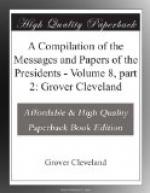NOTIFICATION OF ELECTION.
Mr. Webster, from the committee appointed for that purpose yesterday, reported that the committee had waited on John Quincy Adams, of Massachusetts, and had notified him that in the recent election of a President of the United States, no person having received a majority of the votes of all the electors appointed, and the choice having consequently devolved upon the House of Representatives, that House, proceeding in the manner prescribed by the Constitution, did yesterday choose him to be President of the United States for four years, commencing on the 4th day of March next, and that the committee had received a written answer, which he presented to the House. Mr. Webster also reported that in further performance of its duty the committee had given the information of this election to the President.
February 10, 1825.
Reply of the President Elect.
Washington,
February 10, 1825.
Gentlemen:
In receiving this testimonial from the Representatives of the people and States of this Union I am deeply sensible to the circumstances under which it has been given. All my predecessors in the high station to which the favor of the House now calls me have been honored with majorities of the electoral voices in their primary colleges. It has been my fortune to be placed by the divisions of sentiment prevailing among our countrymen on this occasion in competition, friendly and honorable, with three of my fellow-citizens,




